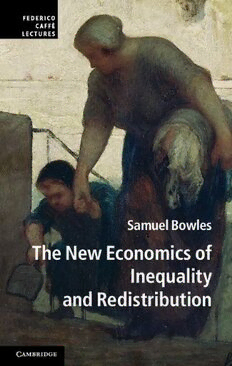
The New Economics of Inequality and Redistribution PDF
Preview The New Economics of Inequality and Redistribution
TheNewEconomicsofInequalityandRedistribution Economistswarnthatpoliciestoleveltheeconomicplayingfieldcomewith aheftypricetag.Butthisso-called“equality–efficiencytrade-off”hasproven difficulttodocument.Thedatasuggest,instead,thattheextraordinarylevels ofeconomicinequalitynowexperiencedinmanyeconomiesaredetrimental totheeconomy.Moreover,recenteconomicexperimentsandotherevidence confirm that most citizens are committed to fairness and are willing to sacrificetohelpthoselessfortunatethanthemselves.Incorporatingthelatest results from behavioral economicsand the newmicroeconomics of credit andlabormarkets,Bowlesshowsthatescalatingeconomicdisparityisnot theunavoidablepriceofprogress.Ratheritispolicychoice–oftenavery costlyone.Here,drawingonhisexperiencebothasapolicyadvisorandan academiceconomist,heoffersanalternativedirection,anovelandoptimis- ticaccountofamorejustandbetterworkingeconomy. Samuel Bowles heads the Behavioral Sciences Program at the Santa Fe Institute. He has taught economics at Harvard University, the University of Massachusetts,andtheUniversityofSiena.Heistheauthor,mostrecently,of Microeconomics:Behavior,Institutions,andEvolution(2004),ACo-operative Species:HumanReciprocityanditsEvolution(2011,withHerbertGintis),and articlesinScience,Nature,theQuarterlyJournalofEconomics,theJournalof Public Economics, and other academic journals. He has also served as an economicadvisortoUSpresidentialcandidatesRobertF.KennedyandJesse Jackson,andformerSouthAfricanPresidentNelsonMandela,andhastaught crashcoursesineconomicstotradeunionists,communityactivists,andothers. FedericoCaffe` Lectures ThisseriesofannuallectureswasinitiatedtohonorthememoryofFederico Caffe`.TheyarejointlysponsoredbytheDepartmentofPublicEconomicsat theUniversityofRome,whereCaffe`heldachairfrom1959to1987,andthe BankofItaly,whereheservedformanyyearsasanadvisor.Thepublication ofthelectureswillprovideavehicleforleadingscholarsintheeconomics profession,andfortheinterestedgeneralreader,toreflectonthepressing economicandsocialissuesofthetimes. The New Economics of Inequality and Redistribution Samuel Bowles incollaborationwith Christina Fong, Herbert Gintis, Arjun Jayadev, andUgo Pagano CAMBRIDGE UNIVERSITY PRESS Cambridge,NewYork,Melbourne,Madrid,CapeTown, Singapore,Sa˜oPaulo,NewDelhi,MexicoCity CambridgeUniversityPress TheEdinburghBuilding,CambridgeCB28RU,UK PublishedintheUnitedStatesofAmericabyCambridgeUniversityPress, NewYork www.cambridge.org Informationonthistitle:www.cambridge.org/9781107601604 ©SamuelBowles2012 Thispublicationisincopyright.Subjecttostatutoryexception andtotheprovisionsofrelevantcollectivelicensingagreements, noreproductionofanypartmaytakeplacewithoutthewritten permissionofCambridgeUniversityPress. Firstpublished2012 PrintedintheUnitedKingdomattheUniversityPress,Cambridge AcatalogrecordforthispublicationisavailablefromtheBritishLibrary LibraryofCongressCataloginginPublicationdata Bowles,Samuel. Theneweconomicsofinequalityandredistribution/SamuelBowlesin collaborationwithChristinaFong,HerbertGintis,ArjunJayadev,andUgo Pagano. pages cm.–(FedericoCaffèlectures) Includesbibliographicalreferencesandindex. ISBN978-1-107-60160-4(pbk.) 1. Incomedistribution. 2. Fairness. I. Title. HB523.B685 2012 339.2–dc23 2012004203 ISBN978-1-107-01403-9Hardback ISBN978-1-107-60160-4Paperback CambridgeUniversityPresshasnoresponsibilityforthepersistenceor accuracyofURLsforexternalorthird-partyInternetwebsitesreferredto inthispublication,anddoesnotguaranteethatanycontentonsuch websitesis,orwillremain,accurateorappropriate. For GeraldCohen(1941–2009)and DavidGordon(1944–1996) inmemoriam Contents Listofillustrations pageviii Preface xi 1 Theneweconomicsofinequalityandredistribution 1 2 Theeconomiccostofwealthinequality 34 3 Feasibleegalitarianisminacompetitiveworld 73 4 Globalization,culturalstandardization,andthe politicsofsocialinsurance 101 5 Reciprocity,altruism,andthepoliticsofredistribution 131 6 Conclusion:Thenew(notsodismal)scienceof inequalityandredistribution 159 Appendices 164 Workscited 171 Index 184 Illustrations Figures 1.1 Governancestructure,wealthinequality,productivity, andinequalityofopportunity page5 1.2 Incomeinequalityandprivatesecuritypersonnelas afractionofacity’slaborforce 11 1.3 Theemergenceofagarrisoneconomy:guardlabor intheUS 12 1.4 Theguard-laborburdenacrosscountries 12 1.5a Economicpolarizationandguardlaborasafraction ofanation’slaborforce 13 1.5b Teachersvs.guards?Socialspendingandguardlabor 13 1.6 Alternativeapproachestoeconomicpolicy 17 1.7 Theworldcapitalisteconomyduringthegolden ageoftradeunionsandthewelfarestate:1950–79 22 1.8 Anexpandedpolicymenu:diagnosisanddistribution 25 1.9 Conflictandco-ordination 28 1.10 Investmentandproductivityinaprisoner’sdilemma 31 2.1 Theprojecttechnology 44 2.2 Autopiancreditmarket:thecompletecontractscase 46 2.3 Thecreditmarketwithnon-contractiblerisk 48 2.4 Thecompetitiveinterestrateandcreditmarketexclusion 53 2.5 Efficiencylossesduetowealthinequality 57 2.6 Indifferencelociofadecreasinglyrisk-averseperson, andthechoiceofrisklevel 63 Listofillustrations ix 2.7 Thecertainty-equivalentpayofftowageemployment foraveryrisk-averse(a)andlessrisk-averse(b) worker 65 2.8 Increasingtheassetsoftheworkeraltersthechoice ofcontractfromwageworktoownership 67 3.1 Equilibriumemploymentandwageswhencapital isgloballyhyper-mobile 84 3.2 Multipleequilibriaduetoendogenousrisk 85 3.3 Endogenoustransfersandpublicinvestment 88 3.4 Co-operativeproductionmayexpandequilibrium employmentandcertaintyequivalents 93 4.1 Indifferencelociofadecreasinglyrisk-aversecitizenry withataxonomyofcitizensaccordingtotheirassets andassociatedexpectedincomeandriskexposure 111 4.2 Acitizen’soptimallevelofinsurance 113 4.3 Socialinsuranceandthezero-taxlocus 114 4.4 Changingdistributionofcitizensandzero-taxlocus undertheinfluenceofglobalization 117 4.5 TheBIGreducesriskexposureandinducesgreater risk-taking,resultinginanincreaseinexpected income 124 4.6 Learningthelinguafrancareducestheexperienced risklevelandinducesahigherchoiceofrisk 126 4.7 TheBIGreducesandmayeliminatetheincentiveto learnthelinguafranca 127 5.1 Explainingconcernaboutpoverty:datafrom 12Europeannations 136 5.2 Determinantsofsupportforredistribution 148 5.3 Effectsonthesupportforredistributionofrespondents’ beliefsintheimportanceofvariousfactorsfor gettingaheadinlife 151 Table 2.1 Creditmarketresultsforthecasewheretheborrower hasnowealth 49
